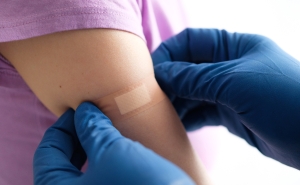Should I Vaccinate My Kids Against COVID-19? Yes. Here’s Why.
The Covid vaccines are safe, they work—and they’re a critical tool for ending the pandemic.

COVID vaccines were authorized in November for emergency use in 5- to 11-year-olds in the U.S.—but uptake of the shots among kids has been stubbornly slow.
Just 26.4% of kids in this age range are fully vaccinated, posing risks for individual kids and vulnerable adults, and stalling progress toward ending the pandemic.
It’s understandable that parents have questions and concerns about the shots, says vaccine hesitancy expert Rupali Limaye, PhD ’12, MPH, MA, deputy director of the International Vaccine Access Center. To help people have effective conversations about why kids should get vaccinated, Limaye developed COVID Vaccine Ambassador Training: How to Talk to Parents, a free course through Coursera.
Driving the hesitancy: “The consistent message throughout the pandemic has been that the virus is mild for children,” says Limaye.
And while that’s largely been the case, the omicron wave has seen more kids getting sick with COVID and being hospitalized, and research is revealing long-term consequences even from mild illness. All this increases the sense of urgency to get kids vaccinated.
Misinformation and disinformation have also sowed confusion about the shots’ safety and effectiveness. And a patchwork of ever-shifting COVID policies, from both schools and government officials, have made it difficult for parents to know who to trust.
So why should parents get their kids vaccinated? Limaye and fellow vaccine expert Kawsar Talaat, MD, explain.
The vaccines work, and they’re safe.
You may have read about recent research showing that the Pfizer vaccine—the only one authorized in the U.S. for children under 12—didn’t do a stellar job when it came to preventing omicron infections in kids.
However, the latest data show that COVID vaccines do protect kids from severe disease and hospitalization, even from omicron. And that’s their main purpose.
We also know they’re safe. COVID vaccines have a stronger-than-usual evidence base, says Talaat, an associate professor in International Health who conducts clinical trials in the Center for Immunization Research. Traditionally, children’s vaccines are tested on a small group of adults—maybe 20 or 30—to make sure the vaccine is safe in that group first. But because COVID hit older populations so hard, the vaccine was developed for adults first.
“This is probably the only vaccine that’s been given to children that’s been used in billions of adults before being given to children, so we have a huge safety database,” says Talaat.
They protect against long COVID and MIS-C.
10%–30% of people infected with the coronavirus will experience long COVID symptoms, according to early studies. Even kids who only had mild infections can experience these persistent COVID symptoms, which range from fatigue and shortness of breath to changes in taste or smell.
Kids who get COVID after being vaccinated, though, are less likely to suffer from long COVID and MIS-C, a rare but potentially deadly post-COVID hyper-inflammatory condition.
They allow kids to stay in school … and help to protect vulnerable adults.
Children have suffered dearly from two years of educational disruptions and isolation from their peers, with untold impacts on their mental health, social and emotional development, and educational achievement.
COVID outbreaks in schools are going to happen, but vaccinated kids have a better chance of being able to stay in school during an outbreak if they don’t show symptoms, says Talaat. Guidance for unvaccinated kids, on the other hand, is to quarantine for five days after an exposure.
And that extra layer of protection not only allows kids to get back to being kids—playing with friends, having sleepovers, and participating in sports—it also helps protect any vulnerable adults that they may interact with, like grandparents or people who are immunocompromised.
The patchwork of school mask policies and the ongoing challenge of improving school building ventilation make vaccination even more important.
COVID can be dangerous even for healthy kids.
Although older people are far more likely to die from COVID than children, the CDC counts the disease as one of the top 10 causes of death for 5- to 11-year-olds. More than 1,500 children ages 17 and under have died of COVID-19 in the U.S.
“Some of those kids may have underlying health problems,” says Talaat, “but there have been totally healthy kids who’ve died. That’s now a completely preventable death.”
New evidence shows an increased risk of heart disease and strokes, and deleterious impacts on the brain after COVID—even among people who didn’t have severe disease.
“What this virus is doing in our bodies is something that is going to take years to understand, and so the best way to protect our kids from this is to vaccinate them,” Talaat says.
Public health depends on it.
The success of vaccines is measured in public health crises that don’t happen—but experts are concerned that the crisis of confidence around COVID vaccines is spreading mistrust to other immunizations, says Limaye. “We’re already starting to see drops in MMR [measles, mumps, and rubella] coverage.”
Maintaining trust in vaccines is crucial to keeping at bay deadly diseases like measles, diphtheria, and polio which, thanks to vaccines, we’ve been lucky enough to largely put behind us in the U.S.
Ironically, “that’s sort of the downfall,” says Limaye. “People haven’t seen these diseases … and that's because the vaccines have been so effective.”
Annalies Winny is associate editor of Global Health NOW, a website and daily e-newsletter produced by the Bloomberg School.





